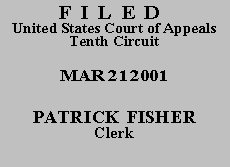 UNITED STATES COURT OF APPEALS
UNITED STATES COURT OF APPEALS
 UNITED STATES COURT OF APPEALS
UNITED STATES COURT OF APPEALS
| TERRY JOE CORTEZ,
Petitioner - Appellant, v. JAMES SAFFLE, Director, The Oklahoma Department of Corrections; STATE OF OKLAHOMA, Respondents - Appellees. |
No. 00-7123
|
On May 16, 1988, petitioner was charged with possession of contraband in a penal institution, Okla. Stat. Ann. tit. 57, § 21 (West 1988), in Oklahoma state court. He filed an application for a competency determination April 25, 1989, but waived his right to the hearing two days later. After entering a plea of nolo contendere, petitioner was sentenced to twenty years imprisonment. On May 8, 1989, Cortez filed a motion to withdraw his plea. The motion was denied August 8, 1989, and the denial was affirmed by the Oklahoma Court of Criminal Appeals ("OCCA") on August 19, 1992.
Petitioner filed an application for post-conviction relief in state court on October 1, 1998. The application was denied, and that denial was affirmed by the OCCA on April 30, 1999. Petitioner filed his federal habeas application on October 26, 1999.
Pursuant to the Antiterrorism and Effective Death Penalty Act of 1996 ("AEDPA"), Pub. L. No. 104-132, 110 Stat. 1214, prisoners generally have one year from the date on which their convictions become final to petition for federal habeas corpus relief. 28 U.S.C. § 2244(d)(1). A conviction becomes final "by the conclusion of direct review or the expiration of the time for seeking such review." § 2244(d)(1)(A). The one-year period of limitation is subject to equitable tolling in extraordinary circumstances. See Miller v. Marr, 141 F.3d 976, 978 (10th Cir. 1998).
In his Application for COA and Opening Brief, petitioner does not argue that his circumstances warrant equitable tolling but rather that "pre-AEDPA standards" should apply to his case. (Petitioner's Br. passim.) We have held that "prisoners whose convictions became final on or before April 24, 1996 must file their [habeas] motions before April 24, 1997."(1) United States v. Simmonds, 111 F.3d 737, 746 (10th Cir. 1997); Miller, 141 F.3d at 977. Although the period of limitation is tolled for the "time during which a properly filed application for State post-conviction or other collateral review . . . is pending," 28 U.S.C. § 2244(d)(2), Cortez's state post-conviction petition was not filed until October 1, 1998, well after the period of limitation expired on April 24, 1997.
Cortez argued to the district court that he was not aware of his right to pursue his mental incompetence claim under 28 U.S.C. § 2254 until October 1999 when he consulted with a fellow inmate who was familiar with "this area of the law." (I R., Doc. 7 at 8.) Because his ignorance of the law is not an extraordinary circumstance warranting equitable tolling, see Miller, 141 F.3d at 978, we conclude that Cortez's habeas application is time-barred.
The application for COA is DENIED, and the appeal is DISMISSED.
The mandate shall issue forthwith.
Entered for the Court,
Carlos F. Lucero
Circuit Judge
*. The case is unanimously ordered submitted without oral argument pursuant to Fed. R. App. P. 34(a)(2); 10th Cir. R. 34.1(G). This order and judgment is not binding precedent, except under the doctrines of law of the case, res judicata, and collateral estoppel. The Court generally disfavors the citation of orders and judgments; nevertheless, an order and judgment may be cited under the terms and conditions of 10th Cir. R. 36.3.
1. The OCCA affirmed the district court's denial of petitioner's motion to withdraw his plea August 19, 1992. His conviction became final ninety days later--on or about November 17, 1992--when his time to file a petition for writ of certiorari in the United States Supreme Court expired. Locke v. Saffle, 237 F.3d 1269, 1273 (10th Cir. 2001).